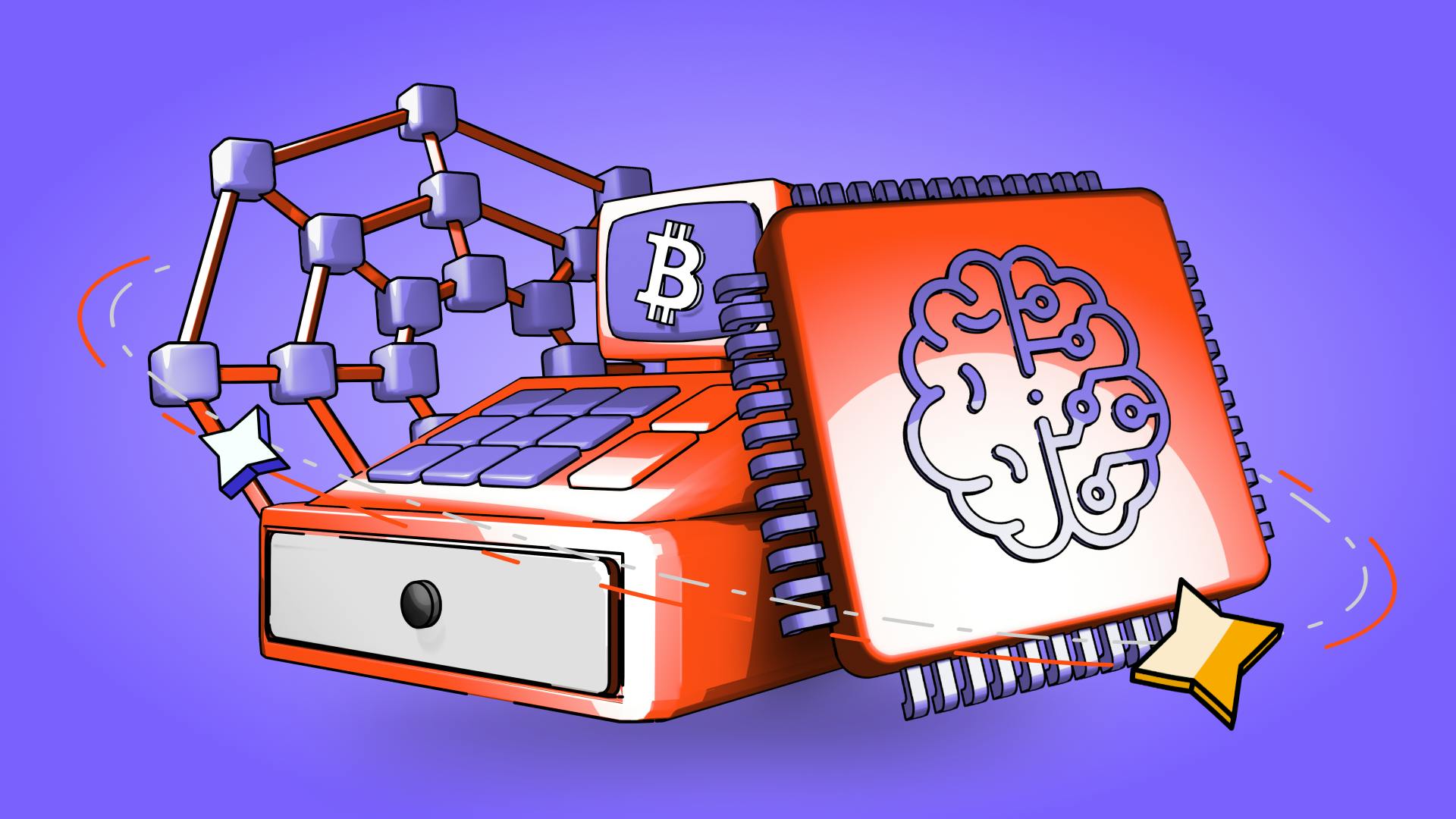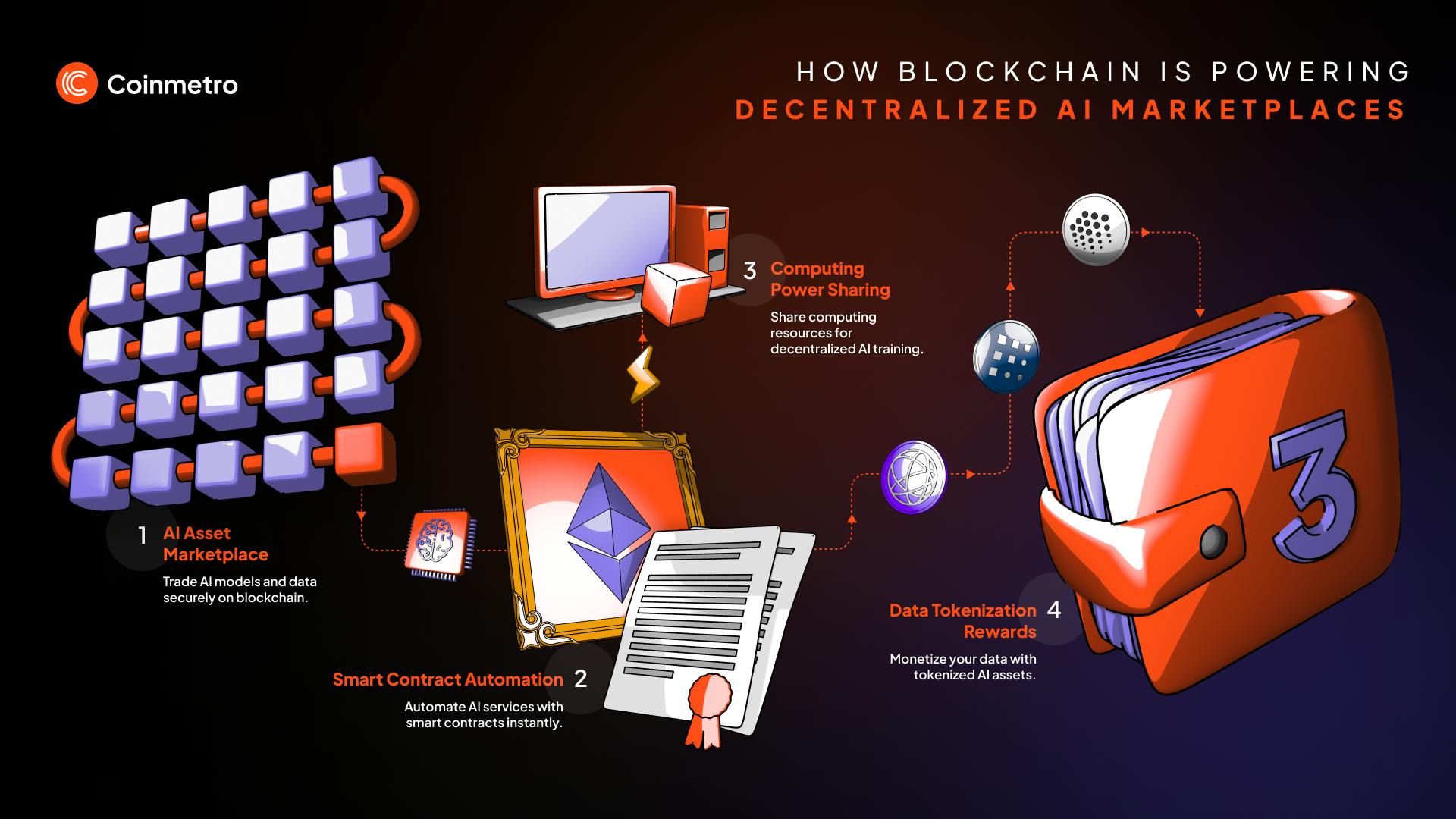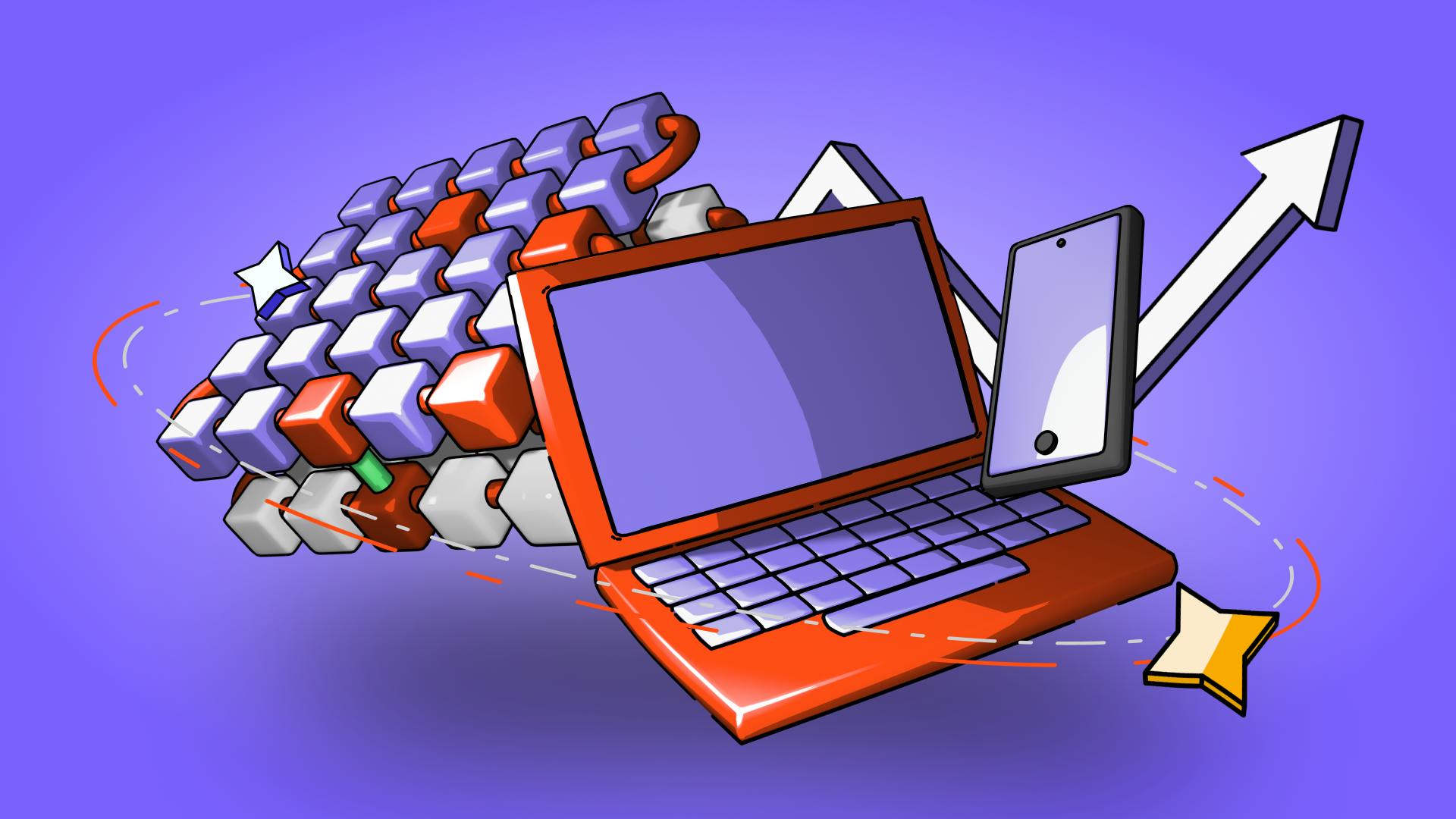Decentralized AI Marketplaces: How OCEAN, FET & THT Power the Future of AI Models
December 5, 2025

by Coinmetro Editorial Team
December 5, 2025
Artificial intelligence (AI) advances fast in cryptocurrency markets today. Blockchain technology boosts this progress and changes AI development profoundly. Decentralized AI marketplaces like Ocean Protocol, Fetch.AI, and ThoughtAI (THT) deliver sophisticated and transformative solutions: Ocean Protocol secures data ownership, empowering users to share and monetize it while retaining full control. Fetch.AI enhances automation and efficiency, enabling AI systems to optimize decisions across decentralized networks. ThoughtAI (THT) advances this ecosystem, leveraging blockchain to streamline AI computation and reward innovation.
Blockchain makes AI tech more open, secure, and transparent. It removes the need for centralized AI providers, preventing a few corporations from controlling AI models and computing power. By decentralizing AI, blockchain boosts innovation, ensures fair access, and builds trust in AI-driven solutions.
This article explores the shift toward decentralized intelligence, highlighting Ocean Protocol (OCEAN), Fetch.ai (FET), and ThoughtAI (THT) as key players shaping AI’s future.
This article will outline:
- What are decentralized AI marketplaces?
- Why blockchain matters for AI marketplaces
- Top decentralized AI marketplaces
- Fetch.ai (FET)
- Ocean Protocol (OCEAN)
- ThoughtAI (THT)
- Future of decentralized AI
Read More on the Intersection of Artificial Intelligence and Blockchain Technology
Decentralized AI marketplaces use blockchain technology to trade AI models, data, and computing power. Unlike traditional platforms, they remove middlemen and rely on smart contracts for direct and secure transactions. This approach improves AI accessibility, security, and transparency.
Developers convert AI models and datasets into NFTs or smart contracts. These assets can be bought and sold on the blockchain using cryptocurrencies like Ethereum. Instead of relying on centralized cloud providers, AI workloads are processed by a distributed network of computing nodes. This reduces costs and prevents AI control from being concentrated in a few companies.
Transparency and Security – Blockchain records all transactions, ensuring verifiable and tamper-proof AI access.
Incentivized Innovation – Developers earn crypto rewards when their AI models are used, driving further innovation.
Greater Accessibility – Small businesses and individuals gain access to advanced AI services, reducing dependence on large corporations.
Ownership and Control – Tokenization guarantees clear asset ownership, preventing unauthorized use of AI models.
Decentralizing AI through blockchain enhances trust, security, and fairness. It ensures AI services are widely available and equitably distributed, fostering a more open technological future.
Learn About AI-Powered Crypto Trading: The Rise of Advanced Algorithmic Strategies

Blockchain is changing AI marketplaces by removing central control and making AI services more accessible. It allows AI models, data, and computing power to be shared securely without middlemen. This improves trust, security, and fairness in AI-driven economies.
AI models can process transactions using smart contracts, which execute agreements automatically. They handle data access, payments, and AI-driven outputs without human intervention. This reduces fraud risks and improves efficiency.
AI models and datasets can be tokenized as NFTs or governance tokens, allowing developers to sell access while keeping control. Users can buy AI services on-chain, ensuring fair pricing and secure payments. Tokenization also helps fund AI research and drive innovation.
AI training requires large computing power, usually controlled by big tech firms. Blockchain networks allow users to share GPU resources in exchange for crypto rewards. This lowers AI training costs and prevents monopolization.
Blockchain tracks AI decisions through on-chain audits. AI models can be reviewed and adjusted through decentralized governance, preventing bias and manipulation. This increases security and builds trust in AI-driven processes.
Blockchain and AI together create a fairer, more transparent marketplace where AI models can operate securely without centralized restrictions.
By decentralizing AI services, Fetch.ai, Ocean Protocol, and ThoughtAI (THT) remove barriers to AI adoption, ensuring secure, fair, and efficient access to AI models and datasets. These platforms drive a more open and equitable AI ecosystem, paving the way for trustless AI automation and machine learning in Web3.
Fetch.ai is a decentralized AI network that enables autonomous software agents to perform complex tasks across multiple industries. These AI agents learn, adapt, and make real-time decisions, optimizing processes like crypto trading, supply chain logistics, and smart city management. Fetch.ai’s network leverages blockchain-powered smart contracts to ensure secure, trustless interactions between AI agents, businesses, and users.
- AI-driven agents operate without human intervention, improving efficiency in industries such as finance, energy markets, transportation, and e-commerce.
- The network enables machine-to-machine transactions, where AI agents negotiate and execute deals in real time.
- Businesses can deploy custom AI agents to automate workflows and optimize resource allocation.
Utility: Powers transactions, AI model execution, smart contract interactions, and staking.
Incentives: Users earn FET by providing computing power, training AI models, or developing AI agents.
Governance: Token holders can participate in network upgrades and decision-making processes.
Adoption: Fetch.ai is integrating with DeFi, mobility networks, and enterprise AI solutions to expand its real-world impact.
Ocean Protocol is a decentralized AI marketplace that facilitates secure data sharing, AI training, and analytics. It allows businesses and individuals to tokenize, buy, and sell datasets while maintaining control over access rights. Ocean’s ecosystem ensures that AI models can be trained on high-quality data without exposing sensitive information, making it essential for AI development, scientific research, and enterprise analytics.
- Uses blockchain-based data tokens, allowing users to control, track, and monetize their datasets while ensuring privacy.
- AI model training is decentralized, reducing dependence on large tech companies for machine learning resources.
- Researchers and businesses can access AI-ready data without relying on centralized data storage solutions.
- Supports Compute-to-Data technology, enabling AI models to train on data without moving it off-chain, preserving security.
Utility: Used for payments, governance, staking, and access to AI-driven data services.
Incentives: Data providers are rewarded with OCEAN when their datasets are used for AI training or analytics.
Governance: Token holders vote on protocol improvements and network changes.
Enterprise Adoption: Used by AI startups, enterprises, and data-driven industries to create monetizable AI data assets.
Fetch.ai, Ocean Protocol & SingularityNET Unite to Create Artificial Superintelligence Alliance
ThoughtAI is a decentralized AI platform that embeds AI directly into data, creating self-aware data entities called Nuances. These Nuances autonomously process, analyze and act upon information, eliminating the need for traditional application layers. By decentralizing AI workflows, ThoughtAI enhances efficiency, scalability, and security across industries such as finance, healthcare, and supply chain management.
- Uses Nuances, transforming data into intelligent entities that autonomously manage themselves, reducing reliance on external AI applications.
- AI model processing is decentralized, operating on a distributed network to ensure transparency and efficiency without centralized control.
- Leverages blockchain-powered security, ensuring data integrity, traceability, and secure AI execution across the network.
- Enables real-time AI-driven decision-making, automating business processes, and optimizing workflows with autonomous intelligence.
Utility: Facilitates transactions, compensates developers, and supports AI-driven operations on the ThoughtAI network.
Incentives: Users earn THT by contributing computing power or sharing AI-driven data insights.
Adoption: ThoughtAI integrates with Web3 applications, enterprise AI solutions, and decentralized automation frameworks, expanding its real-world use cases.
ThoughtAI’s decentralized approach to AI model deployment and data intelligence aligns with the broader movement toward AI democratization. By leveraging blockchain, it ensures fairer access, increased security, and a more autonomous AI-driven future.
Decentralized AI advances quickly, blending with blockchain tools like DeFi and DAOs. Smart contracts power autonomous AI models for secure, scalable economies. This shift boosts efficiency across digital systems.
Integration with DeFi & DAOs: DeFi uses AI for risk assessment, fraud detection, and predictive analytics. AI-driven DAOs govern independently, relying on real-time data and fixed rules. They enhance treasury management and DeFi investment strategies.
AI-driven Smart Contracts: Smart contracts adapt to AI, tracking market trends and refining conditions. They improve trading algorithms, lending protocols, and on-chain governance security. AI detects anomalies, reducing manipulation risks.
AI and the Metaverse: The metaverse employs AI assistants for interaction and content generation. AI avatars manage virtual economies and personalize digital identities. Art, music, and landscapes evolve dynamically.
The Rise of AI DAOs: AI-powered DAOs handle protocols, financial models, and research funding. They operate autonomously, cutting reliance on centralized authority. These systems drive strategic business decisions.
▶️ Watch: Decentralized AI - The Power of Permissionless Intelligence - TOKEN2049 Singapore
Decentralized AI marketplaces spark a major turn toward secure, open technology. Blockchain supports platforms like Ocean Protocol, Fetch.ai, and ThoughtAI (THT), curbing centralized AI power. This drives innovation, fair access, and trust in digital networks.
Smart contracts streamline AI tasks, cutting fraud and boosting efficiency without middlemen. Tokenization allows developers to profit from models while keeping full ownership. Together, they craft an AI future free from corporate limits.
Decentralized computing aids this shift, sharing GPU power for AI training. Contributors gain crypto rewards, loosening big tech’s grip on machine learning resources. On-chain governance ensures fairness, tracking decisions to limit bias or errors.
This blend of AI and blockchain offers security, transparency, and independence. It fuels scalable systems, from DeFi to metaverse projects, powered by decentralized intelligence. The outcome is a stronger, more open AI ecosystem for everyone.
Join the Coinmetro community on Discord and Telegram, where forward-thinking traders and investors gather to share insights, explore new opportunities, and dive deep into cryptocurrencies. Should you need any help, please contact our world-class Customer Support Team via 24/7 live chat or email at hello@coinmetro.com.
To become a Coinmetro user today, Sign Up now or head to our new Exchange if you are already registered to experience our premium trading platform.
Tags
Related Articles

Regulatory Sandboxes: Fostering Crypto Innovation Within Legal Frameworks
The cryptocurrency industry’s fast rise fuels an important debate. Innovation aims to transform finance, enhancing speed and access. Yet, regulators…
5m

Crypto Options Trading: Strategies and Market Insights
Cryptocurrency markets have rapidly expanded beyond simple buying and selling. One of the most significant developments has been the rise of…
6m

The Rise of Social-Fi: Blending Social Media with Decentralized Finance
In recent years, social media and finance have started to merge, creating Social-Fi. This concept blends the engagement of social platforms with…
6m

DeFi Insurance Platforms to Watch in 2024
Decentralized Finance (DeFi) insurance addresses the growing need for insurance against hacks, smart contract failures, and other DeFi-related risks.…
7m